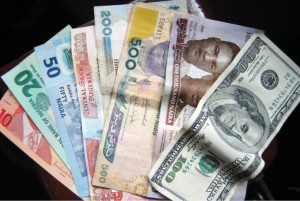Naira Declines as Oil Prices Fall
 The naira declined, paring its first monthly gain in three against the dollar, as Nigeria’s benchmark crude blend retreated.
The naira declined, paring its first monthly gain in three against the dollar, as Nigeria’s benchmark crude blend retreated.
The currency of Africa’s biggest oil producer, which has risen 1.3 percent this month, slipped 0.2 percent to 160.925 per dollar as of 12:10 p.m. in Lagos, the commercial capital. That trims its monthly advance to 1.1 percent, according to data compiled by Bloomberg.
Nigerian benchmark Bonny Light crude, which has risen 8.4 percent this month, fell 0.3 percent today. The Central Bank of Nigeria, which uses twice-a-week foreign exchange auctions to stabalize the currency, sold $517 million last week, the most in three. The Abuja-based regulator is scheduled to sell dollars to lenders today and on Wednesday.
“We have seen how the CBN’s game plan comes under pressure when the oil price tumbles,” Gregory Kronsten, head of macroeconomic research at FBN Capital Ltd. in London, wrote in a report today.
The central bank said July 24 it reduced the amount of foreign exchange banks can hold as a percentage of their shareholders’ funds to 1 percent from 3 percent and kept its interest rateunchanged at 12 percent. The amount of cash as a percentage of deposits that commercial banks must hold with the central bank was increased to 12 percent from 8 percent.
The naira may weaken “following the post Monetary Policy Committee naira rally,” Leon Myburgh and Coura Fall, strategists at Citigroup Inc. in Johannesburg, wrote in a note today. “The move was overdone as the actual market impact of these measures was not that significant.”
The yield on Nigeria’s seven-year domestic bonds due June 2019 fell one basis point to 16.42 percent, according to July 27 data on the Financial Markets Dealers Association website. Yields on the nation’s $500 million of Eurobonds due 2021 declined 10 basis points to 5.36 percent today.








